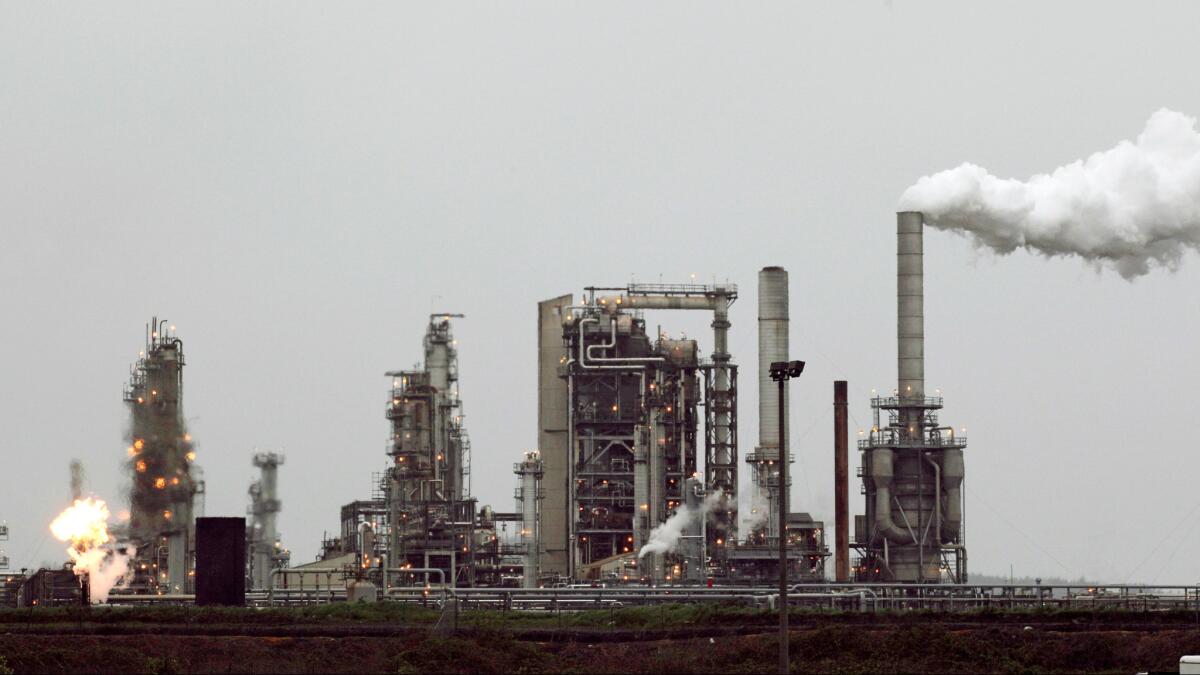Oil refiners agree to pay $425 million to reduce air pollution in the West

- Share via
Reporting from Seattle — Concluding a long legal climb to cleaner air, the federal government Monday announced a record $425-million settlement with two oil refiners that is expected to reduce pollution emissions in the West by almost 43,000 tons annually.
The Justice Department and the Environmental Protection Agency said the agreement with subsidiaries of Tesoro Corp. of San Antonio and Par Hawaii Refining resolves accusations of Clean Air Act violations against the two corporations.
“This settlement will reduce emissions in six separate states and ultimately result in cleaner air,” said Dennis McLerran, EPA Region 10 director.
The deal, years in the making, includes a civil penalty. But most of the settlement money - $403 million - is to be spent by the corporations to remedy the ongoing pollution they are accused of creating.
A consent decree with the refiners was filed in federal court in Texas on Monday, along with a civil complaint. After a 30-day public comment period, a judge will be asked to approve the decree.
If for some reason it is rejected, the Justice Department can proceed with the civil litigation, said Assistant Atty. Gen. John Cruden, who specializes in environmental cases.
The affected refineries are located in Martinez, Calif., and Anacortes, Wash., and at sites in Alaska, Hawaii, North Dakota and Utah.
Keith Casey, Tesoro’s executive vice president for operations, said in a statement that the company was pleased with the agreement, which will help Tesoro “further improve our environmental performance.”
The settlement figure was a record for refiners, Cruden said. The Clean Air Act violations by the companies were expansive, including leaks of polluted compounds and violations involving repair work and flaring (burning off excess hydrocarbons), he said.
The so-called fugitive emissions can cause eye, nose and throat irritations for nearby residents and eventually lead to liver, kidney and central nervous system damage.
Cruden and other officials who spoke at a news conference on Seattle’s waterfront said there would be an “immediate effect” on community health from the agreement, particularly among asthma sufferers. But any changes will come only after the refiners have installed new pollution-control equipment.
Tesoro will also spend about $12 million on environmental projects in local communities and pay a $10.45 million civil penalty.
Noting the jets passing overhead, freight trucks lining up at nearby shipping piers and a mammoth container ship being pushed by tugs into a berth, Mark Asmundson, executive director of the Northwest Clean Air Agency, said “refineries are crucial, critical, to our way of life.”
But so is the effect they have on our health, he added.
“You can treat water,” Asmundson said, “you can’t treat the air we breathe.” That’s why settlements such as this are necessary if corporations are to be prevented from fouling the air in the first place, he said.
Tesoro will also contribute $1 million to replace old diesel school buses with natural-gas buses in Contra Costa County, where the city of Martinez is located.
More to Read
Sign up for Essential California
The most important California stories and recommendations in your inbox every morning.
You may occasionally receive promotional content from the Los Angeles Times.













